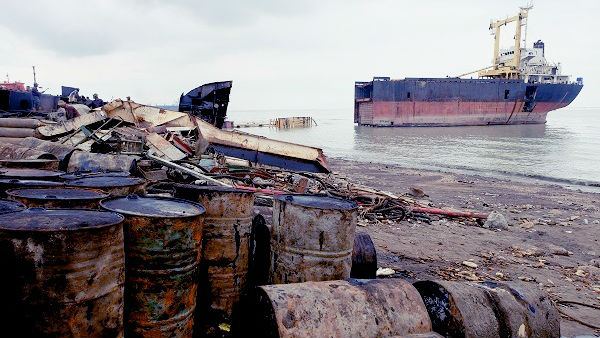Major companies such as H&M, Tetra Laval, ABB, Philips, Volvo and Volkswagen have asked their forwarders – the shipping companies they use to transport their goods – to adopt sustainable ship recycling policies.
In January, the NGO Shipbreaking Platform published its annual list of global dumpers including 641 ships that were sold for shipbreaking on the tidal beaches of India, Pakistan and Bangladesh. Several of these ships were owned by companies that the members of the Clean Shipping Network (CSN), a network of 32 multinationals, use to transport their products.
CSN members have now reacted with a statement condemning the breaking of ships on tidal beaches. In the statement, shipping companies mentioned on the Platform’s list of dumpers are asked to review their policies and practices regarding the selling and recycling of end-of-life vessels. The shipping companies are also asked to report on their ship recycling policy in the Clean Shipping Index questionnaire, a tool used by leading international cargo owners to evaluate the environmental performance of their providers of sea transports.
Eleven of the CSN members even went one step further by sending a letter directly to their business partners in the maritime industry stating that working with companies that do not deal responsibly with their end-of-life fleet is unacceptable for them. They warned that sustainable ship recycling is an issue they will consider when signing agreements with shipping companies, and stated that poor performance in the field of environment and social policies have consequences for their business decisions.
“We believe collaboration is a must to bring about systematic change to the sea transport industry. The Clean Shipping Network members use the procurement process to enhance sustainable development and to raise awareness on how the shipping industry impacts the environment”, says Sara Sköld, Director of the Clean Shipping Index.
According the Platform, thirteen large shipping companies follow sustainable ship recycling policies, including Royal Dutch Boskalis, Canadian CSL Group and Singapore-based China Navigation Company. More recently, German Hapag-Lloyd joined the group of shipowners that opt for ship recycling off the beach.
Sustainability manager speaks out on issues

Fredrika Klarén, Sustainability Manager at KappAhl, a CSN member said: “At KappAhl, one important task in our sustainability work is to contribute to a sustainable development in our suppliers’ business. Thus we take measures to promote a shipping industry built on environmental and social values.
“Sustainability requirements are a part of all of our supplier relations. We have followed the development of social issues in the shipping industry closely, and have seen the reporting from the Shipbreaking Platform regarding ship dismantling on the beaching yards of Bangladesh, India and Pakistan, which leads to environmental pollution and unsafe working conditions.
“To address this issue, we have integrated requirements regarding a policy for safe and environmentally sound recycling of vessels in our tender process with forwarders, with good response from our suppliers. But, in the end, the availability of shipowners with the right policy and control systems is low, and we have not been able to see a direct effect from our requirements.
“We are therefore very happy to now collaborate with our fellow members in the Clean Shipping Network in order to address the urgent need for action when it comes to this matter – we hope that it will contribute to the change that is needed to end these unsustainable practices which effect the environment and people’s lives so negatively.”
Shipping industry supports change
Some believe the issue is not as clear cut as it would seem, as some yards are instigating positive changes in their practices.
Ship recycling yards in India, Pakistan and Bangladesh need to be part of the global scheme of sound ship recycling and those yards in Alang which have invested in fully upgrading their facilities to meet the terms of internationally-agreed rules should be rewarded by winning more business, said Akihiro Tamura, Director of Shipbuilding Policy at the Japan External Trade Organisation (Jetro), shortly after returning from a fact finding trip to Indian recycling yards in Alang earlier this year.
The four-day visit, arranged in association with cash buyer Global Marketing Systems (GMS), was attended by a 14 strong Japanese industry and government delegation, which included officials from the Ministry of Land, Infrastructure, Transport and Tourism; the Japanese Shipowners Association; Jetro; shipping companies K-Line and JX Ocean; ClassNK; Japanese Labour Union; Japan Marine Science; as well as GMS.
The delegation visited Alang with the intention of assessing the quality of beach recycling yards in the region.
 Welcoming the comments from the visit, Nikos Mikelis, Non-executive Director of GMS, said it was up to the shipping industry and the regulators to see the improvement in conditions themselves. “We have already invited legislators from the European Commission, maritime administrations, IMO, as well as global shipowner representatives to visit the area and the invitation is still open.
Welcoming the comments from the visit, Nikos Mikelis, Non-executive Director of GMS, said it was up to the shipping industry and the regulators to see the improvement in conditions themselves. “We have already invited legislators from the European Commission, maritime administrations, IMO, as well as global shipowner representatives to visit the area and the invitation is still open.
“Separately, the IMO should be invited to hold a workshop/seminar in India to not only raise awareness of the improvements which have been made there but to inform and educate other yards as to what is needed to conform to the terms of the Hong Kong International Convention for the Safe and Environmentally Sound Recycling of Ships,” he said.
Amit Malhotra, trader and GMS representative in Japan, said the Japanese delegation was pleased with the changing attitude of the SRIA (Ship Recycling Industries Association) towards trying to understand and comply with the Hong Kong Convention. He said: “If yards in India comply with the terms of the Hong Kong Convention and the government of India ratifies it, then Japanese owners will have no concerns sending their vessels to India.”
A strong theme running through the visit of the Japanese delegation was to encourage India to meet the standards of the Hong Kong Convention – something Tamura said the four top level yards in the region, Leela Ship Recycling, Priya Blue Industries, Kalthia Shipbreaking and Shree Ram Vessel Scrapping, seem to be very close to achieving already.
These yards have improved their working procedures and have upgraded their facilities to include concrete floors with drainage, bilge water pumps, protective clothing, hazardous-waste disposal facilities as well as segregated work areas among other things.
He said: “Our visit was very fruitful in being able to see the actual situation on the ground and the many improvements made in Alang. I am also impressed that they are very open to visitors and we even visited some yards without any prior notification which is important. And the workers were all wearing helmets and working clothes as well as protective shoes.”
Japan is so supportive of the Indian ship recycling sector that it is moving towards providing Official Development Assistance to upgrade facilities and improve operations in the region.
Nothing has been officially decided yet but the next step will be to carry out surveys of the yards to determine what support will be actually needed and to draw up an agreement between both countries, Tamura stressed.
“Of course we would like to support larger numbers of yards in the region, but naturally there is some constraint regarding budget and time. However, our ultimate wish and purpose in providing assistance to India is to encourage the Indian government to move towards accession to the Hong Kong Convention.
“The Indian recycling industry plays a vital role in international ship recycling and in order to ensure a sound and safe ship recycling industry, those beaching recycling facilities in India, Pakistan and Bangladesh should be included into the global scheme of sound ship recycling. We want the Indian recycling yards and we want the Indian government to join the global recycling framework, or Hong Kong Convention.”
Tamura said he hoped India would continue to be open to the outside world when it came to recycling, and he wanted to send a more positive message to the outside world to invite “a lot of people to come in and see their yards. I think this is important as is a more intense monitoring of the environment in the area which would help to give a better understanding to the outside world of what is being achieved by the yards,” he said.
Source: Maritime Executive










